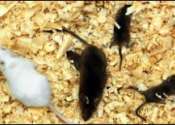Researchers outline barriers to treating fear and anxiety
A misunderstanding of how the certain parts of the brain function has hampered the creation of pharmaceuticals to effectively address fear and anxiety disorders, a pair of researchers has concluded. Their analysis, which ...
Sep 9, 2016
0
9






